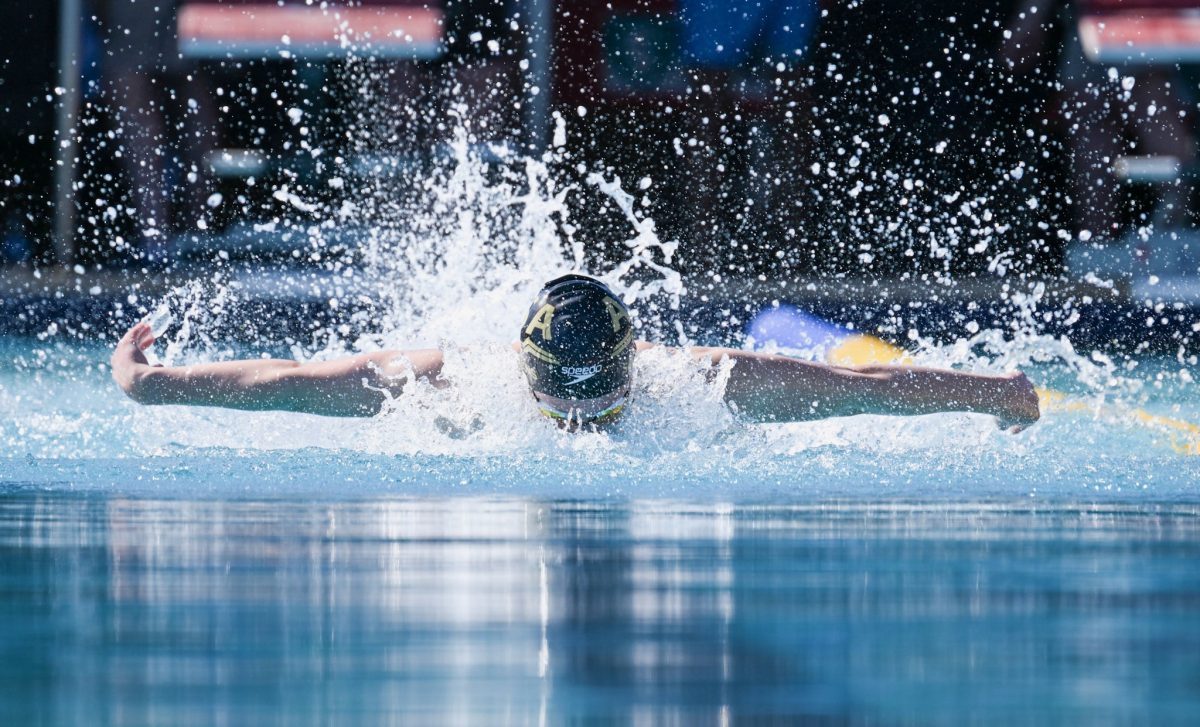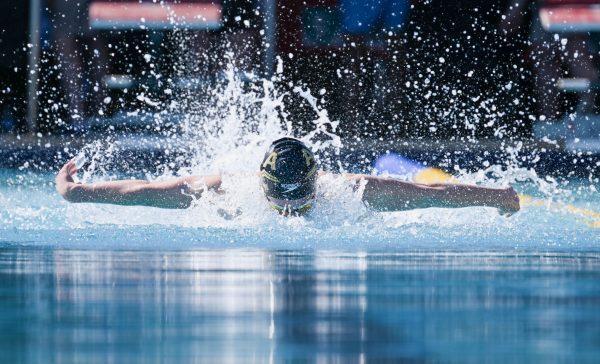New Biden proposal addresses transgender athletes
Graphic illustration by Ashley Huang
The proposal reignited debate over the eligibility of transgender student athletes to compete, with some arguing that Title IX should protect fairness and inclusivity in women’s sports.
May 18, 2023
On April 6, the Biden Administration and the U.S. Department of Education proposed a rule that offers educational institutions a new framework for formulating eligibility standards for transgender student-athletes. The proposed policy allows schools to create their own policies while ensuring that all students have equal opportunities in sports. However, the new rule has ignited controversy regarding the extent to which transgender athletes should be allowed to participate in sports alongside cisgender girls and women.
The proposal requires universities and K-12 schools, who receive federal funding to take into account age, level of competition and the nature of a sport when developing policies that would prevent transgender student athletes from competing. For example, basketball and tennis may warrant different restrictions due to varying physical demands. Nevertheless, the proposal forbids outright bans against transgender athletes, allowing them to compete in sports depending on the school’s policies and discretion. The U.S. Department initiated the proposal to alleviate uncertainty surrounding the eligibility of transgender students in sports and to provide clarity for students, parents and coaches.
“At face value, I do not like the law,” Lynbrook Gender and Sexuality Alliance member Charlotta “Charlie” Dai said. “It does forbid the direct banning of transgender athletes, however it gives loopholes for states and schools to ban them, albeit with different wording. It does not have the effect necessary to combat the rampant transphobia in national discussions in women’s sports.”
The National Collegiate Athletic Association has already made changes to rules regarding the eligibility of transgender female student-athletes to compete. In 2022, transgender women need to have taken a testosterone-suppressing treatment for a year before competing against other cisgender women. However, since August 2022, the NCAA has required athletes to meet required specific testosterone levels that vary by sport.
The ongoing debate regarding transgender athletes highlights the challenges of balancing inclusivity and fairness in sports. Some individuals are concerned that including transgender athletes in women’s sports may violate Title IX, which aims to promote equality and fairness in sports.
A key issue in this debate is whether transgender girls possess a testosterone-based advantage over cisgender girls, which could potentially undermine fair competition. If this is the case, it is argued that Title IX should be used to protect the rights of cisgender girls and women, and to ensure fairness in competition in sports.
“There is a biological difference between transgender women and cisgender women,” track and cross country runner Lily Fang said. “I believe the best way to have transgender athletes compete in sports is to create a new division for them.”
This idea falls in line with the fairly recent ruling by the International Swimming Federation, which banned transgender women from competing in women’s events in June 2022. The ruling came three months after Lia Thomas, a transgender woman on the University of Pennsylvania’s swim team, won the NCAA Division I swimming championship in the 500-yard women’s freestyle, highlighting the issue of balancing equity and inclusivity in sports. FINA’s solution to maintaining an inclusive environment was to establish a new, “open” category for transgender women to compete in in the future. The public response to the ruling was divided, similar to the reaction to the Biden proposal. Some argued that the ban was discriminatory towards transgender athletes and lacked scientific evidence to support it.
“If a person identifies as a woman, then they are a woman, and if a man identifies as a man, then they are a man,” Dai said. “Title IX is against sex-based discrimination, and to discriminate against transgender athletes based on their sex would be to violate Title IX. There is also no known advantage for trans athletes in sports.”
Past research has led to inconclusive evidence over whether transgender women athletes do have an unfair advantage in competition. While some studies suggest that transgender women may have a performance advantage over cisgender women, other research has shown that hormone therapy and testosterone suppression, which has been implemented at the collegiate level, can significantly decrease muscle mass, bone density, and other physical characteristics, leveling the playing field and reducing the possibility of unfair advantage.
Many fear that the proposal may encourage more discrimination against transgender athletes. While the law prohibits bans on transgender athletes to participate in sports, many see the proposal as a disguised way for schools to legally restrain transgender athletes from elite and collegiate sports through their enforced policies.
The proposal marks the first time the government has directly addressed this issue. This is an important first step toward finding a solution that balances fairness and inclusivity while protecting transgender students’ access to sports.
This story was originally published on The Epic on May 8, 2023.





![With the AISD rank and GPA discrepancies, some students had significant changes to their stats. College and career counselor Camille Nix worked with students to appeal their college decisions if they got rejected from schools depending on their previous stats before getting updated. Students worked with Nix to update schools on their new stats in order to fully get their appropriate decisions. “Those who already were accepted [won’t be affected], but it could factor in if a student appeals their initial decision,” Principal Andy Baxa said.](https://bestofsno.com/wp-content/uploads/2024/05/53674616658_18d367e00f_o-1200x676.jpg)






![Junior Mia Milicevic practices her forehand at tennis practice with the WJ girls tennis team. “Sometimes I don’t like [tennis] because you’re alone but most of the time, I do like it for that reason because it really is just you out there. I do experience being part of a team at WJ but in tournaments and when I’m playing outside of school, I like that rush when I win a point because I did it all by myself, Milicevic said. (Courtesy Mia Milicevic)](https://bestofsno.com/wp-content/uploads/2024/06/c54807e1-6ab6-4b0b-9c65-bfa256bc7587.jpg)








![The Jaguar student section sits down while the girls basketball team plays in the Great Eight game at the Denver Coliseum against Valor Christian High School Feb. 29. Many students who participated in the boys basketball student section prior to the girls basketball game left before half-time. I think it [the student section] plays a huge role because we actually had a decent crowd at a ranch game. I think that was the only time we had like a student section. And the energy was just awesome, varsity pointing and shooting guard Brooke Harding ‘25 said. I dont expect much from them [the Golden Boys] at all. But the fact that they left at the Elite Eight game when they were already there is honestly mind blowing to me.](https://bestofsno.com/wp-content/uploads/2024/05/IMG_7517-e1716250578550-900x1200.jpeg)









![BACKGROUND IN THE BUSINESS: Dressed by junior designer Kaitlyn Gerrie, senior Chamila Muñoz took to the “Dreamland” runway this past weekend. While it was her first time participating in the McCallum fashion show, Muñoz isn’t new to the modeling world.
I modeled here and there when I was a lot younger, maybe five or six [years old] for some jewelry brands and small businesses, but not much in recent years,” Muñoz said.
Muñoz had hoped to participate in last year’s show but couldn’t due to scheduling conflicts. For her senior year, though, she couldn’t let the opportunity pass her by.
“It’s [modeling] something I haven’t done in a while so I was excited to step out of my comfort zone in a way,” Muñoz said. “I always love trying new things and being able to show off designs of my schoolmates is such an honor.”
The preparation process for the show was hectic, leaving the final reveal of Gerrie’s design until days before the show, but the moment Muñoz tried on the outfit, all the stress for both designer and model melted away.
“I didn’t get to try on my outfit until the day before, but the look on Kaitlyn’s face when she saw what she had worked so hard to make actually on a model was just so special,” Muñoz said. “I know it meant so much to her. But then she handed me a blindfold and told me I’d be walking with it on, so that was pretty wild.”
Caption by Francie Wilhelm.](https://bestofsno.com/wp-content/uploads/2024/05/53535098892_130167352f_o-1200x800.jpg)








![Junior Mia Milicevic practices her forehand at tennis practice with the WJ girls tennis team. “Sometimes I don’t like [tennis] because you’re alone but most of the time, I do like it for that reason because it really is just you out there. I do experience being part of a team at WJ but in tournaments and when I’m playing outside of school, I like that rush when I win a point because I did it all by myself, Milicevic said. (Courtesy Mia Milicevic)](https://bestofsno.com/wp-content/uploads/2024/06/c54807e1-6ab6-4b0b-9c65-bfa256bc7587-375x600.jpg)




![As part of the Lafayette community, local youth soccer club Rockwood United SC took part in the annual Homecoming Parade. The club was created by former LHS soccer coaches, Saverio Traversa and Craig Wideman, to provide better quality soccer coaching. We want to make sure that [soccer] is taught right, because when learned correctly its the best sport in the world, Wideman said.](https://bestofsno.com/wp-content/uploads/2024/05/IMG_4632-e1714576359118-600x400.jpg)

